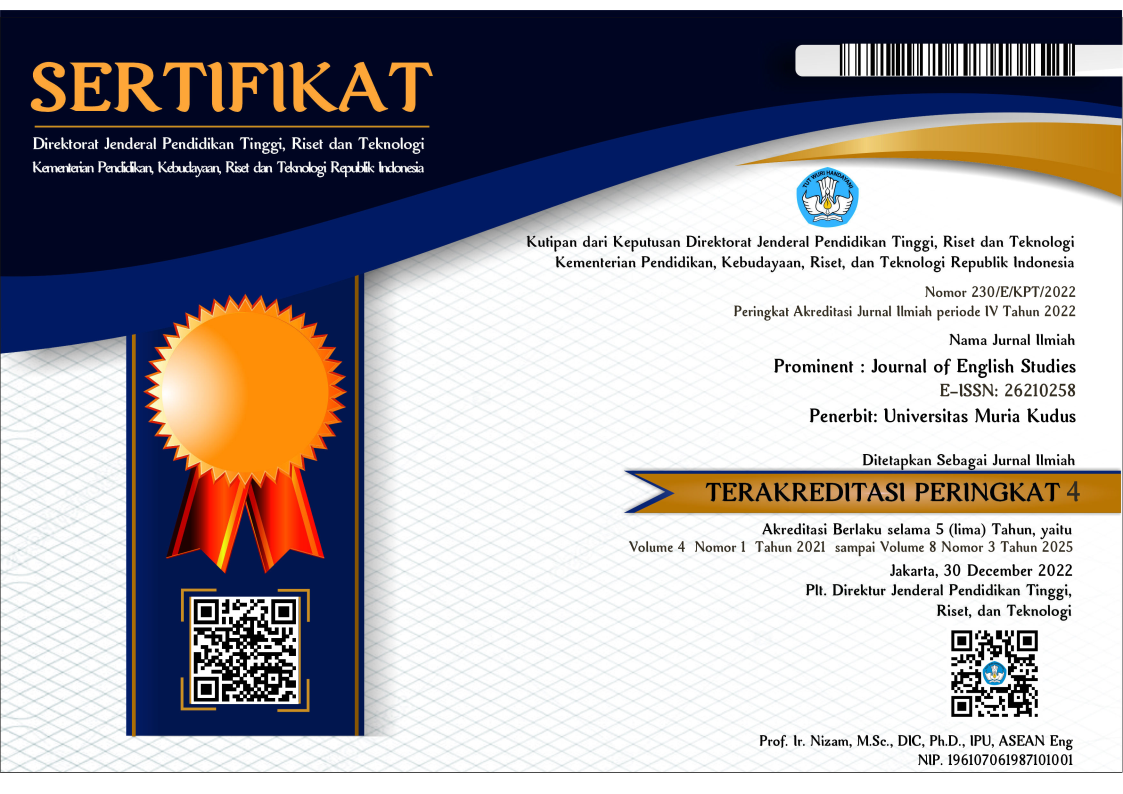Enhancing English as a Foreign Language Reading Proficiency: Key Skills for Comprehension and Engagement
Abstract
A high level of competence in reading English as a second language is crucial for achieving academic excellence and personal growth. This concept paper outlines methods for improving students' English as a Foreign Language reading ability. The approach involves extracting reading methods from main journal articles, practicing and analyzing reading extracts, and combining them to practice essential reading skills. The aim of this study is to establish a foundation for reading by emphasizing key elements such as reading methods, understanding various types of texts, critical thinking, and inference abilities, considering cultural context in reading, and assessing and tracking reading skill growth. The interdependent elements mutually reinforce one another, as fluency enhances understanding and understanding facilitates the increase of vocabulary. Evidence suggests that employing good reading techniques, such as skimming, scanning, and detailed reading, enables pupils to traverse texts proficiently and comprehend essential concepts and particulars. Gaining knowledge of different literary genres and text structures improves overall reading proficiency, while cultivating analytical thinking abilities enables students to deduce, assess arguments, and form conclusions supported by textual evidence. Understanding the cultural background of books helps to interpret their meanings and subtle details, enhancing the reading experience. Consistent evaluation and surveillance of reading progress ensures that students recognize areas in need of improvement and evaluate their growth over time. By understanding and using the skills presented in this paper, English as a Foreign Language learners can improve their reading proficiency, positioning themselves for enduring achievement in academic, professional, and social environments.
Keywords
Full Text:
PDFReferences
Akatsuka, Y. (2019). Awareness of Critical Thinking Attitudes and English Language Skills: The Effects of Questions Involving Higher-order Thinking. Journal of Pan-Pacific Association of Applied Linguistics, 23(1). https://doi.org/10.25256/paal.23.2.4
Akkaya, N., & Demirel, M. V. (2012). Teacher candidates’ use of questioning skills in during-reading and post-reading strategies. Procedia of Social and Behavioral Sciences, 46, 4301–4305. https://doi.org/10.1016/j.sbspro.2012.06.244
Alghonaim, A. S. (2020). Impact of related activities on reading comprehension of EFL students. English Language Teaching, 13(4), 15–27. https://doi.org/10.5539/elt.v13n4p15
Bahrum, A. (2023). EFL eeading fluency: A review bibliometric and VOSviewer analysis. JSE Journal Sains and Education, 1(1), 22–29. https://doi.org/10.59561/jse.v1i1.5
Baquero-Vargas, M. P., & Pérez-Salas, C. P. (2023). Authenticity of Formative Assessment Tasks Reported in Research. Journal of Higher Education Theory and Practice, 23(2). https://doi.org/10.33423/jhetp.v23i2.5814
Bilge, H., & Kalenderoglu, I. (2022). The relationship between reading fluency, writing fluency, speaking fluency, reading comprehension, and vocabulary. Egitim ve Bilim, 47(209), 25–53. https://doi.org/10.15390/EB.2022.9609
Boyte, K. J. (2016). Foreign language teachers’ attitudes toward written recall protocol as a practice of reading comprehension assessment. TESOL International Journal, 11(2), 108–132.
Cakir, A., Unaldi, I., Arslan, F. Y., & Kilic, M. (2016). Effects of reading strategies and depth of vocabulary knowledge on Turkish EFL learners’ text inferencing skills. English Language Teaching, 9(8), 11–20. https://doi.org/10.5539/elt.v9n8p11
Elston, A., Tiba, C., & Condy, J. (2022). The role of explicit teaching of reading comprehension strategies to an English as a second language learner. South African Journal of Childhood Education, 12(1), 1–10. https://doi.org/10.4102/sajce.v12i1.1097
Forsia, L., Sari, F. I., & Purnawati, P. (2022). Correlation of students’ reading interest, vocabulary mastery and their reading comprehension. English Education, Linguistics, and Literature Journal, 1(2), 122–131. https://doi.org/10.32678/ell.v1i2.6561
Hasyim, F. (2018). The effects of self-efficacy on motivation of reading English academic text. Ahmad Dahlan Journal of English Studies, 5(1), 25–34. https://doi.org/10.26555/adjes.v5i1.8597
Lailiyah, M., Wediyantoro, P. L., & Yustisia, K. K. (2019). Pre-reading strategies on reading comprehension of EFL students. EnJourMe (English Journal of Merdeka): Culture, Language, and Teaching of English, 4(2), 82–87. https://doi.org/10.26905/enjourme.v4i2.3954
Li, L. (2022). A tentative discussion on how to help junior high school students improve their writing skills through post-reading activities. Journal of Contemporary Educational Research, 6(6), 35–42. https://doi.org/10.26689/jcer.v6i6.4054
Lintangsari, A. P., Emaliana, I., & Kusumawardani, I. N. (2022). Improving Learners’ Critical Thinking and Learning Engagement through Socratic Questioning in Nominal Group Technique. Studies in English Language and Education, 9(2). https://doi.org/10.24815/siele.v9i2.22352
Lloyd, Z. T., Kim, D., Cox, J. T., Doepker, G. M., & Downey, S. E. (2022). Using the annotating strategy to improve students’ academic achievement in social studies. Journal of Research in Innovative Teaching and Learning, 15(2), 218–231. https://doi.org/10.1108/JRIT-09-2021-0065
Masrai, A. (2019). Vocabulary and reading comprehension revisited: Evidence for high-, mid-, and low-frequency vocabulary knowledge. SAGE Open, 9(2), 1–13. https://doi.org/10.1177/2158244019845182
Rodrigues, B., Ribeiro, I., & Cadime, I. (2023). Reading, linguistic, and metacognitive skills: are they reciprocally related past the first school years? Reading and Writing, 36(9), 2251–2273. https://doi.org/10.1007/s11145-022-10333-y
Rohman, A. (2022). Exploring Reading Speed Used by EFL Students. Pendas Mahakam: Jurnal Pendidikan Dan Pembelajaran Sekolah Dasar, 6(2), 142–146. https://doi.org/10.24903/pm.v6i2.868
Silvia Febrianti, M., Nur Arifin, M., & Siti Rohbiah, T. (2022). The use of pre-reading strategy in teaching reading comprehension. Journal of English Language Teaching and Cultural Studies, 5(1), 12–21. https://doi.org/10.48181/jelts.v5i1.14363
Simanjuntak, E. (2019). Developing a model of HOTS questions for reading narrative text. JEES: Journal of English Educational Study, 1(2), 77–81. https://doi.org/10.31932/jees.v1i2.331
Syaripuddin, R. (2023). Students’ needs on English reading comprehension materials in Indonesian Higher Education. PIJAR: Jurnal Pendidikan Dan Pengajaran, 1(2), 194–206. https://doi.org/10.58540/pijar.v1i2.196
Tang, L. (2016). Exploration on Cultivation of Critical Thinking in College Intensive Reading Course. English Language Teaching, 9(3). https://doi.org/10.5539/elt.v9n3p18
Thuraisingam, T. G. (2017). Implementing pre-reading strategies to improve struggling ESL learners’ interest and comprehension in English reading lessons. International Journal of Education, Culture and Society, 2(3), 94–100. https://doi.org/10.11648/j.ijecs.20170203.13
Ushioda, E., & DÖrnyei, Z. (2017). Beyond Global English: Motivation to Learn Languages in a Multicultural World: Introduction to the Special Issue. Modern Language Journal, 101(3). https://doi.org/10.1111/modl.12407
Yurtsever, A., & Özel, D. (2021). The Role of Cultural Awareness in the EFL Classroom. Turkish Online Journal of Qualitative Inquiry. https://doi.org/10.17569/tojqi.776499
DOI: https://doi.org/10.24176/pro.v7i2.12659
Refbacks
- There are currently no refbacks.
Prominent Journal of English Studies is licensed under a Creative Commons Attribution-ShareAlike 4.0 International License.
Dedicated to:

in Collaboration with APSPBI:






